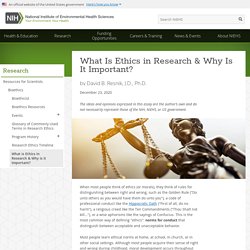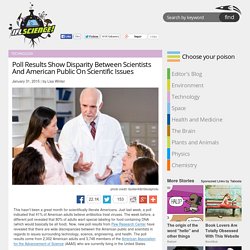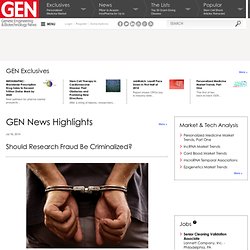

Information Ethics - Includes ITEC websites. What is Ethics in Research & Why is it Important? December 1, 2015 The ideas and opinions expressed in this essay are the author’s own and do not necessarily represent those of the NIH, NIEHS, or US government.

When most people think of ethics (or morals), they think of rules for distinguishing between right and wrong, such as the Golden Rule ("Do unto others as you would have them do unto you"), a code of professional conduct like the Hippocratic Oath ("First of all, do no harm"), a religious creed like the Ten Commandments ("Thou Shalt not kill... "), or a wise aphorisms like the sayings of Confucius. This is the most common way of defining "ethics": norms for conduct that distinguish between acceptable and unacceptable behavior. Most people learn ethical norms at home, at school, in church, or in other social settings. Although most people acquire their sense of right and wrong during childhood, moral development occurs throughout life and human beings pass through different stages of growth as they mature.
David B. Adobe Reader. Not all scientific studies are created equal - David H. Schwartz. "A popular study from the 1970s that helps sell millions of dollars' worth of fish oil supplements worldwide is deeply flawed, according to a new study being published in the Canadian Journal of Cardiology.

The original study, by Danish physicians H.O. Bang and D.J. Dyerburg, claimed Inuit in Greenland had low rates of heart disease because of their diet, which is rich in fish oil and omega-3 fatty acids from eating fish and blubber from whales and seals. " But there's more! Read more here.David is a founding partner of Innovative Science Solutions, LLC (ISS), a team of scientists, regulatory strategists, and consultants providing a wide range of fully integrated services to industry and counsel. Poll Results Show Disparity Between Scientists And American Public On Scientific Issues. This hasn’t been a great month for scientifically literate Americans.

Just last week, a poll indicated that 41% of American adults believe antibiotics treat viruses. The week before, a different poll revealed that 80% of adults want special labeling for food containing DNA (which would basically be all food). Now, new poll results from Pew Research Center have revealed that there are wide discrepancies between the American public and scientists in regards to issues surrounding technology, science, engineering, and health. The poll results come from 2,002 American adults and 3,748 members of the American Association for the Advancement of Science (AAAS) who are currently living in the United States.
Most of the public appears to view science favorably, with 79% saying that science makes daily life easier. News Highlights:Should Research Fraud Be Criminalized? In science, few things are more dispiriting than instances of scientific misconduct.

Memorable examples abound: the recent retraction of two Nature papers that described stress-induced stem cells; the revelation that results trumpeting the success of an HIV vaccine were deliberately falsified; and perhaps most egregiously, the discrediting of research that purported to link vaccinations with autism. While these and other disturbing instances of scientific misconduct naturally come up whenever we consider how best to preserve the integrity of the scientific enterprise, they may serve to overheat discussion. Alternative or at least complementary points of debate are less anecdotal and more statistical. Statistics, in fact, are at the heart of a “Head to Head” published July 15 in the British Medical Journal. Beneath the title “Should research fraud be a crime? Both contributors cite the same statistics but interpret them differently.
For his part, Dr. Dr. Participant Protections [NIH] Certificates of Confidentiality Certificates of Confidentiality are issued by the National Institutes of Health (NIH) to protect identifiable research information from forced disclosure.
![Participant Protections [NIH]](http://cdn.pearltrees.com/s/pic/th/patient-protections-134928458)
They allow the investigator and others who have access to research records to refuse to disclose identifying information on research participants in any civil, criminal, administrative, legislative, or other proceeding, whether at the federal, state, or local level. Certificates may be granted for studies collecting information that if disclosed could have adverse consequences for subjects or damage their financial standing, employability, insurability, or reputation.
The National Institute of Environmental Health Sciences issues a Certificate of Confidentiality for any study that is pertinent to the mission of the Institute and meets the requirements for issuing a certificate. Note about On-line Application The electronic application must be completed all at once.